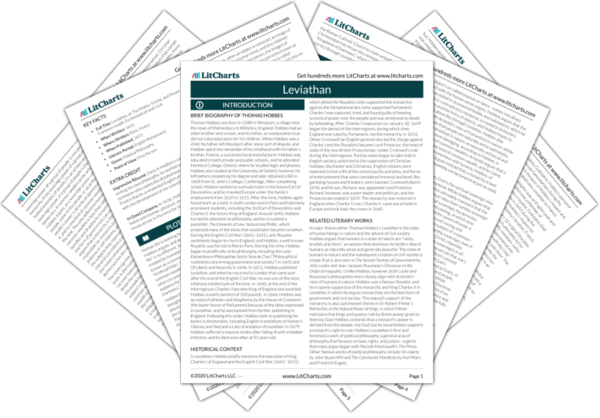Minor Characters
Aaron
Aaron was a prophet and Moses’s brother, and he was the sovereign power of the Israelites after Moses. Hobbes uses Aaron and his Golden Calf as an example of idolatry.
Abraham
Abraham is a biblical figure from the Old Testament. Abraham was the first to make a covenant with God, in which he agreed to obey God in all things. According to Hobbes, God appeared to Abraham as three angels.
Adam
Adam is a biblical figure from the Old Testament. Adam and God had a covenant in which Adam was to live forever in the Garden of Eden; however, Adam did not obey God and the covenant was voided.
Barnabas
Barnabas was one of Christ’s Apostles according to the New Testament. Like Matthias and Paul, Barnabas was not selected as an Apostle by Christ and was instead selected by an assembly of people at the Church of Antioch, one of the earliest Christian churches.
Theodore Beza
Theodore Beza was a French theologian and Protestant from the 16th century, whom Hobbes offers as an example of a writer of erroneous Holy Scripture. Beza argues in his philosophy that the Kingdome of God began with Christ’s Resurrection.
Constantine
Constantine was Emperor of Rome from 306 to 337, and other than Moses, he was the first Christian sovereign of a common-wealth. According to Hobbes, the New Testament was not considered civil law until Constantine ordered it so during his reign.
Henry VIII
Henry VIII was King of England from 1509 to 1547. King Henry VIII separated the Church of England from papal authority and was excommunicated by Pope Clement VII. Hobbes briefly mentions Henry VIII as an example of unlawful excommunication.
Isaiah
Isaiah was an Israelite who appears in the Old Testament. Isaiah, along with Moses and Samuel, are Hobbes’s examples of true Prophets.
James VI and I
James VI and I was the King of England and Ireland from 1603 to 1625 and King of Scotland from 1567 to 1625. Hobbes briefly mentions King James as “the most wise King” who tried to unite England and Scotland.
Jacob
Jacob is a biblical figure and the grandson of Abraham. Hobbes frequently cites the Old Testament where Jacob appears, particularly the passages that are associated with angels.
John
John is one of Christ’s Disciples in the New Testament. Hobbes quotes the Gospel of John multiple times in Leviathan and uses John and the people of Samaria as an example of the “Imposition of hands,” which is often used in blessings or the ordaining of a new minister.
Joshua
Joshua was Moses’s assistant and the leader of the Israelites after Moses’s death. According to Hobbes, the Book of Joshua in the Old Testament was written well after Joshua’s time. This discrepancy is yet another dubious point of Holy Scripture for Hobbes.
Luke
Luke was a prominent Christian figure and is generally accepted as the main writer of the New Testament. Like Paul, Luke did not live during the time of Christ, which for Hobbes, gives Luke less authority than those biblical figures who lived during Christ’s time, like Saint Peter.
Necho
Necho was an Egyptian king from the 6th century BCE. Necho worshipped idolatry, but still God spoke through him. Necho is Hobbes’s example that all prophets are not pious, nor are they always Christian.
Nostradamus
Nostradamus was a French astronomer and seer whose 1555 book of poems, Les Prophéties, is said to predict the future. Hobbes uses Nostradamus as an example of a false prophet in Leviathan.
Plato
Plato was a Greek philosopher from the fourth century BCE and Aristotle’s teacher. Like Aristotle, Plato is one of the Gentiles whose false philosophies have led to the misinterpretation of Holy Scripture.
